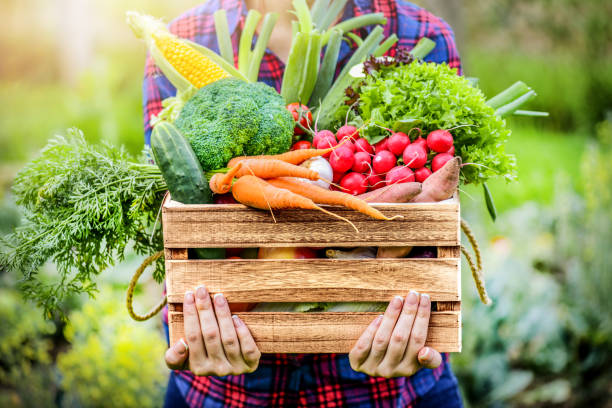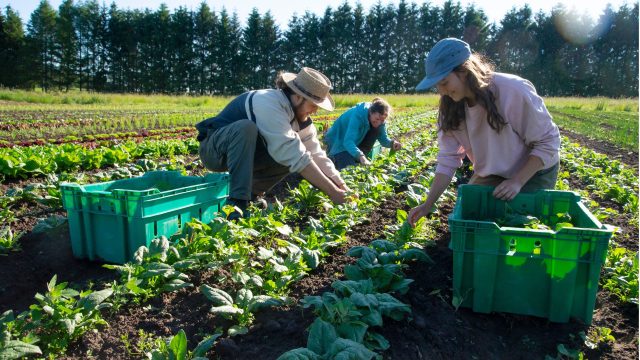Organic food tourism is a recently emerging niche in the tourism industry. Visitors can find the food that they are looking for while connecting with their surroundings through learning about sustainable agriculture, experiencing farm-to-table dining, and in many ways discovering taste in exciting and innovative ways. The greater the knowledge people have regarding food quality, sustainability, and health, the more they want from experiences, not mere tourism alone. Organic food tourism is an environmentally conscious culinary exploration, offering an interesting concept for knowing where your food comes from; giving support to ecological farming, and consuming the freshest ingredients available from that place.
We’ll delve into organic food tourism in this article, discussing its significance, the benefits of the activity, popular destinations, and what makes the journey so worthwhile. Additionally, we will find out how this trend boosts sustainable agriculture, supports the local economy, and helps travelers learn the value of organic farming practices.
Emergence of Organic Food Tourism
Organic food tourism is also called agro-tourism or culinary eco-tourism, and it has become more popular over the years since travelers are becoming more aware of where their food comes from and the environmental impact of the food they consume. Organic food tourism has been boosted by a growing demand for sustainable and healthy food choices and the need to connect more closely with local cultures.

1. Health and Wellness Movement
As people are more health-conscious, people are more concerned about what diet can do to one’s health. This trend has been evident in the high demand for organic foodstuffs that have no harmful chemicals, synthetic pesticides, and genetically modified organisms. Organic food tourism enables travelers to trace food from farms to tables, find out how food choices correlate with their health and enjoy healthy and fresh produce directly from the organic farms.
2. Environmental Awareness and Sustainability
Organic food tourism is closely associated with sustainability because organic farming incorporates fewer environmental footprints in its production processes. It does not require chemical fertilizers and pesticides, just like conventional farming, since it helps in conserving the soil, water, and biodiversity. A travel person who participates in organic food tourism will help in sustaining agriculture and also learn directly the organic methods of farming to ensure a healthy earth planet.
3. Quest for Authentic Cultural Experiences
Organic food tourism allows a tourist to experience the agriculture of a destination firsthand. Organic farms usually have educational tours, hands-on experiences, and farm-stay packages where clients can be taught some of the traditional farming systems, cultural traditions, or the value of local food systems. In this case, travel becomes more knowledge-based, and the people are given a chance to understand their culture and the heritage that they have been a part of for so long; hence the journey is satisfying and memorable.
Benefits of Organic Food Tourism
Organic food tourism offers a lot of benefits for travelers and the visited communities. From sustainable agriculture to increasing the enjoyment of travel experiences, the benefits of organic food tourism extend beyond the dinner table.
1. Educational Experiences
Learning is perhaps one of the essential advantages of organic food tourism. Travelers, during a visit to organic farms, gain knowledge about organic farming practices, soil health, composting, pest control measures, and water conservation. All these are implemented on organic farms. Hence, through a deeper perception of how food is grown, travelers are motivated enough to make more sustainable decisions concerning the food that is being consumed, further augmenting their appreciation of the labor, time, and effort that goes into making organic foods.
2. Health and Well-being
Organic food tourism is very in line with the wellness movement because travelers can acquire food that is healthy, chemical-free, and thus healthy and wholesome. Fresh organic produce directly from the farm source is refreshing because one experiences the pure unaltered flavor of the ingredient. In many organic farms, the tourists are able to benefit from wellness activities, like yoga or meditation.
3. Empowerment for Small-scale Farms and Other Community Beneficiaries
For that matter, organic food tourism provides other income earners at small farms and, indirectly, boosts the whole rural economy because it usually contributes directly to the immediate communities where farm tours typically come with the accommodations with other additional extras like home-style cooking or dining made in-house or even within farms and through the process helps maintain and sustain home farm economies in most the country.
4. Contributing to Environment Sustainability
Supporting organic farms through tourism benefits the environment. Organic farming is usually meant to sustain ecological balance and reduce pollution. As a result of visiting the organic farms and engaging in eco-friendly activities, visitors become advocates for sustainable agriculture and contribute to the conservation of natural resources, biodiversity, and the environment.
5. Culinary Memories
Organic food tourism provides visitors with an experience of food that goes beyond dining. Picking fresh fruits and vegetables, and preparing farm-fresh meals with local chefs, organic food tourism offers visitors the experience of tasting authentic seasonal ingredients at their peak freshness. Immersion in the flavor and quality of the food make every meal a memorable part of the journey.
Popular Organic Food Tourism Destinations
Organic food tourism is among the most developing segments of tourists in several countries around the world, most notably within areas that boast extensive agricultural heritage coupled with sound sustainable farming activities. These are the main destinations for organic food tourism:
1. Italy
Italy is famous for organic agriculture, especially from central regions like Tuscany, Umbria, and Sicily. One known practice of preserving old farming ways is found in Italian organic farm stays, vineyard tours, and olive oil tastings. An agriturismo is a traditional Italian farmhouse that accommodates its guests in the rooms and offers meals that are prepared from the products of the farm. In these agriturismos, the guests can acquire more information on the ways of making pasta, cheeses, and wine in the beautiful sceneries of Italy’s countryside.
2. France
The country of France is quite popular with organic food tourism, primarily because it has an agriculture background spanning thousands of years. Scattered throughout the country, one can find numerous organic vineyards, farms, and orchards offering many tours and tastings along with hands-on experiences. One can visit some of the organic lavender farms, olive groves, and vineyards located in the Provence area and gain firsthand knowledge of organic farming techniques while dining farm-to-table. Its support for organic farming is also represented in the nation’s various farmers’ markets with fresh organic produce and organic cheeses and meat. The bakery products are prepared fresh in batches throughout the day.
3. India
India offers varied agricultural land, which, in recent years, has been functioning as a developing destination for organic food tourism. A few of the states providing fantastic farm-stay opportunities along with organic farming are Kerala, Sikkim, and Uttarakhand. The visitor will learn about local farming methods, Ayurvedic farming, and spices and herbs used in an organic diet in Indian cuisines. Kerala offers retreats of wellness that amalgamate organic food with Ayurvedic treatments, yoga, and meditation, which promote holistic well-being and health.
4. Thailand
Thailand, known for its bright-colored food and agricultural diversification, welcomes organic food tourism in Chiang Mai and Mae Hong Son. Here you take a tour of organic rice paddies, tea plantations, and vegetable farms; insights into organic farming techniques as well as cooking classes. It fits into organic agriculture that the country embraced in terms of food as a result of its traditional cuisine and has become a hub destination for organic food as well as environmentally friendly traveling.
5. New Zealand
New Zealand is among the most in-demand destinations for organic food tourism since it has pure lands coupled with environmental sustainability. For instance, here, there are numerous organic farms, vineyards, and orchards that have been used to offer tours, taste, and farm-to-table dining. There are Marlborough and Hawke’s Bay regions where people visit organic wineries, taste locally produced organic wines and learn about sustainable viticulture practices. New Zealand’s organically farmed land has elements of environmental education whereby different visitors can learn the merits of biodiversity and the conservation of the environment.
Special Organic Experiences in Organic Food Tourism
Organic food tourism encompasses every possible experience for a range of interests and engagement. Some can have farm tours and cooking classes or more extensive farming experiences that connect individuals with their food as much as they are taught about sustainable ways of production.


1. Farm-to-Table Dining
Farm-to-table dining is organic food tourism par excellence: here, a visitor would enjoy a meal cooked with the freshest ingredients. Organically farm-run restaurants usually offer meals based on products that fall into the seasonal line. Here, menu lines usually revolve around ingredients gathered fresh off the farm just to recreate pure regional flavor.
2. Organic Farm Tours
Organic farm tours provide an inside view of how organic farming is conducted. The tours may involve walking through fields, orchards, and greenhouses where the visitor is taught about organic pest control, crop rotation, and soil management. Some of the farms even allow interactive participation, such as planting seeds, harvesting crops, or feeding animals, thus giving a traveler hands-on experience of organic farming.
3. Cooking classes and culinary workshops.
Many organic farms and culinary schools also offer cooking classes that allow guests to learn how to prepare good, wholesome foods from the produce of an organic farm. Such classes often take a classic approach to these old favorite dishes, providing visitors with skills for preparing dishes at home and, at the same time learning the authentic seasoning techniques and flavor combinations that emphasize the natural flavors of organically grown produce.
4. Farm Stays
Stays on farms offer chances to live on an organic farm and experience the dynamics of daily farm life firsthand. These stays are accommodated in rustic farmhouses with meals prepared daily out of fresh farm produce from that day. Guests in the stays can participate in direct involvement in farm activities. It could be milking the cows, collecting fresh eggs, or some farming activities. This enables an individual to get organic farming firsthand and to meet up with the land and its people and animals so perfectly involved in sustainable agriculture.
5. Tasting of Wine and Olive Oil
Organic vineyards and olive groves, typically located in regions known for their wine and olive oil production, usually organize product tastings. The tours also include the vineyard or the olive orchard where you get to learn about the techniques applied in organic cultivation and production. Organic wine and olive oil tastings allow the visitor to enjoy the best quality of products made from organic products, as well as an understanding of the health and environmental benefits of organic production.
Future of Organic Food Tourism
More people embracing sustainable travel and healthy eating will keep the scope and popularity of organic food tourism expanding. Future trends in organic food tourism will be embracing technology, such as virtual farm tours and online cooking classes, which would allow the traveler to experience organic food tourism from any place on Earth. Besides, eco-friendly accommodations and sustainable travel practices will come to be of much interest in the organic food tourism industry, as tourists would be interested in traveling in a manner that will not cause negative impacts on the environment.
Conclusion
Organic food tourism offers a transformative and enriching way of traveling and being exposed to the entire realm of food, sustainability, and culture. As a person goes through a tour, through active exposure to the practice of organic farming, they begin to appreciate more the path that the food product undergoes-from the farm to the table and its relevance with the sustainable agricultural concept. Organic food tourism will allow one to be in contact with the local community, support ecotourism, and experience the flavor of nature at its best. This niche will therefore be the key to environmental sustainability, health, and an even more meaningful connection between the traveler and what they consume.
